Overflow Crowd Hears Ron Paul's Take on Surveillance, Syria and Liberty in Ubben Lecture
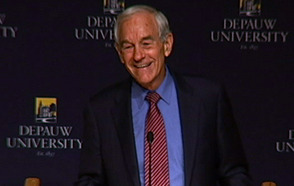
September 10, 2013
In a nation with record government debt that is increasing by the second, "The burden now falls on the next generation, those who attend a college like this and those individuals who are coming of age who will be making the decisions for the country," Ron Paul told an audience at DePauw University tonight. "Because this will not continue; it's impossible to continue."
A three-time presidential candidate and twelve term member of the U.S. House of Representatives (he retired in January), Paul discussed "Our Lives, Your Liberty & America's Future" in a Timothy and Sharon Ubben Lecture. The event took place in DePauw's Kresge Auditorium, where there was not an empty seat in the 1,440-capacity venue. An overflow crowd of about 100 watched a closed circuit video feed in nearby Moore Theatre, and a live webcast 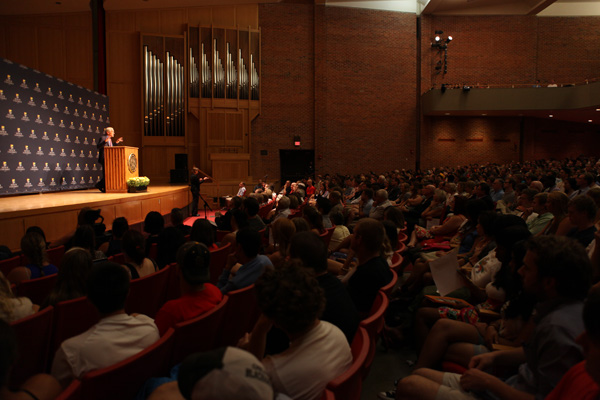 drew another 360 viewers on the Internet.
drew another 360 viewers on the Internet.
Paul says the Republican and Democratic parties are interchangeable on the issues that are important -- especially when it comes to upholding the constitution, moving the nation toward free market economic policies, returning to a foreign policy that is focused solely on protecting America from attack, and removing themselves from the pull of special interests, which he says usually are far removed from the public interest.
"I don't think the government should intervene in our personal lives. I don't think the government should intervene in our economic lives. And I don't think we should be intervening in the affairs of foreign nations when it's none of our business."
But the former congressman sees a shift under way in America, one that began about five years ago. Paul told his DePauw audience, which gave him three standing ovations, "One thing that I've noticed is a lot of young people are very interested and they've become very much involved in the freedom movement and they're very concerned about the country, and they'd like to see 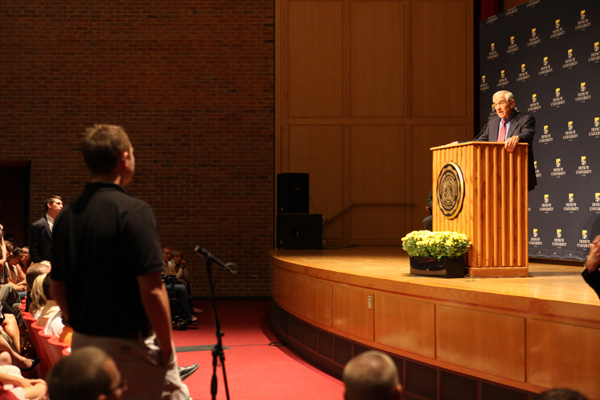 some big changes made," he said as the audience cheered. "And that's what's necessary, because the status quo in Washington -- they're not doing so well." (photo: Hoang Nguyen '14)
some big changes made," he said as the audience cheered. "And that's what's necessary, because the status quo in Washington -- they're not doing so well." (photo: Hoang Nguyen '14)
Paul says the Republican and Democratic parties are interchangeable on the issues that are important -- especially when it comes to upholding the constitution, moving the nation toward free market economic policies, returning to a foreign policy that is focused solely on protecting America from attack, and removing themselves from the pull of special interests, which he says usually are far removed from the public interest.
The recent disclosures that the United States National Security Agency has been operating a clandestine mass electronic surveillance data mining program since 2007 is, in Paul's opinion, just the latest signal of a government that has gone wildly beyond its constitutional boundaries. "I think the government should be there to protect our privacy and we should know what the government is doing, and they shouldn't have secrecy," he said to more applause.
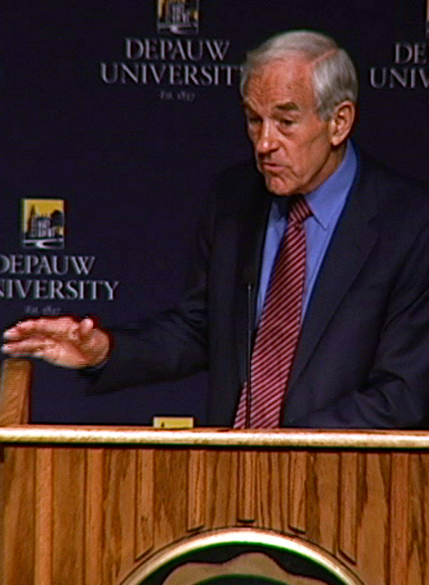 In a land of liberty, truth is appreciated, says Paul, but empires are built by perpetrating lies. "That's why the whistleblowers are the worst kind of people, according to Washington -- they have revealed the truth, and they have to be silenced. Our current president has used the Espionage Act, written in 1917, more times than all the other presidents put together to squelch dissent ... the (Edward) Snowden's of the world, to make sure that they're punished." Paul says that Congress has passed laws to protect who expose misconduct and illegal activities, "yet they are not protected because the people in Washington don't want us to know the truth."
In a land of liberty, truth is appreciated, says Paul, but empires are built by perpetrating lies. "That's why the whistleblowers are the worst kind of people, according to Washington -- they have revealed the truth, and they have to be silenced. Our current president has used the Espionage Act, written in 1917, more times than all the other presidents put together to squelch dissent ... the (Edward) Snowden's of the world, to make sure that they're punished." Paul says that Congress has passed laws to protect who expose misconduct and illegal activities, "yet they are not protected because the people in Washington don't want us to know the truth."
The twelve term congressman recalled that when Daniel Ellsberg released the Pentagon Papers in 1971, he wondered, "What is he doing that for? But now I look at him as a hero. Now we know the truth. Now we know we went into Vietnam and lost 60,000 Americans based on a lie. And the evidence is out there now due to the information we're getting from Snowden and Bradley Manning is that there's a lot of lies still being told about what we were doing and why we went into those wars over here."
Paul stressed, "We must never be frightened by the truth. The American people can handle the truth."
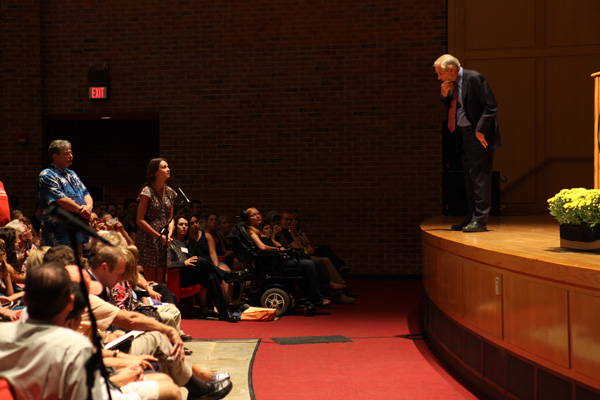 Speaking on the same evening that President Obama addressed the nation to discuss escalating U.S. tensions with Syria, Paul says the mood of the nation is clear -- that it's time to stop intervening in the affairs of other nations. "The American people are saying enough is enough, we don't like it, and now the majority is speaking out. I think that is very healthy, I think we're on the right track and I think this country is going to wake up and rein in this runway interference overseas."
Speaking on the same evening that President Obama addressed the nation to discuss escalating U.S. tensions with Syria, Paul says the mood of the nation is clear -- that it's time to stop intervening in the affairs of other nations. "The American people are saying enough is enough, we don't like it, and now the majority is speaking out. I think that is very healthy, I think we're on the right track and I think this country is going to wake up and rein in this runway interference overseas."
Civil liberties are often casualties of war, Dr. Paul told the audience, but historically wars have only lasted a few years. "But if you have a perpetual war you're less likely to recover those liberties. That's what's happening today," as things like the Patriot Act remain in place in the name of national security, which Paul rejects.
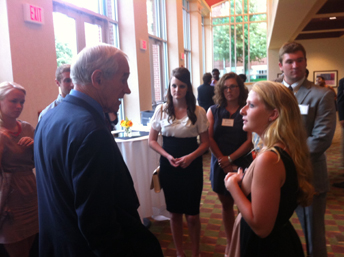 "They think rights come from the government and they can manipulate 'em all the time. Governments can't give us our rights; our rights come in a natural God-given way and the government's there to protect them, not manipulate 'em and take 'em away when they feel like it."
"They think rights come from the government and they can manipulate 'em all the time. Governments can't give us our rights; our rights come in a natural God-given way and the government's there to protect them, not manipulate 'em and take 'em away when they feel like it."
Abuses, according to Paul, "are getting out of control. The Fourth Amendment is essentially gone. When you look at what the NSA is doing -- they can look at every telephone call, every email message, everything we do -- there's nothing left of the Fourth Amendment, and even the First Amendment is shattered, as well." He added that the government's role "is to protect our liberties, not to purposely take 'em away ... The Constitution is written to control the government; it has all these restrictions on the government -- you know, the federal government -- and yet we've allowed that to get out of control and we've allowed the government to do just about what they want in secret.
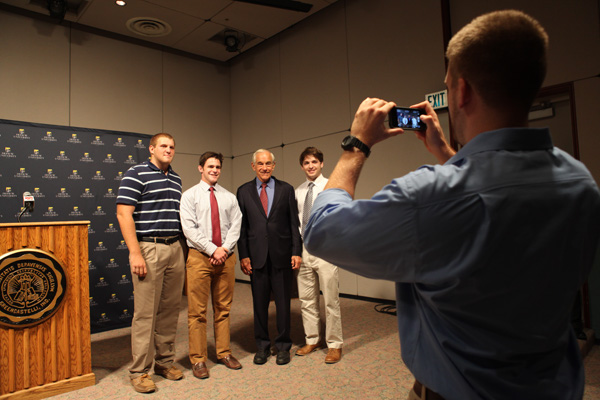 "But the good news is, it can't last, it's going to end, the people are waking up. We have an energized younger generation, we have an Internet to spread our message, and I think we're about to hold feet to the fire and rein in these politicans in Washington."
"But the good news is, it can't last, it's going to end, the people are waking up. We have an energized younger generation, we have an Internet to spread our message, and I think we're about to hold feet to the fire and rein in these politicans in Washington."
A graduate of Gettysburg College and the Duke University Medical School, Ron Paul served his country as a flight surgeon in the U.S. Air Force during the 1960s, and opened a medical practice in Texas in 1968, delivering more than 4,000 babies. But his increasing concern over the state of the nation and the role of government led him to politics and a reputation who "cannot be bought by special interests," in the words of the New York Post.
Dr. Paul remains a powerful voice for limited constitutional government, low taxes, free markets, and a return to sound monetary policies based on commodity-backed currency. He is the author of several books, including Liberty Defined; A Republic, If You Can Keep It; and The School Revolution, which will be released next week. He's been honored by organizations such as the National Taxpayers Union, Citizens Against Government Waste, and the Council for a Competitive Economy and was one of the world's "100 most influential people in the world" for 2012, as named by TIME magazine. He also launched the new Ron Paul Channel over the summer.
Dr. Paul's day at DePauw began with a 4 p.m. forum at the Pulliam Center for Contemporary Media's Watson Forum in which he discussed issues with Jeff Gropp, Norman Miller Johnson Professor of Economics at DePauw, and about 40 students. After hearing the undergraduates' queries about U.S. monetary policy and the Federal Reserve, Paul exclaimed, "You know your stuff. From what I've heard, you're well ahead of Congress."
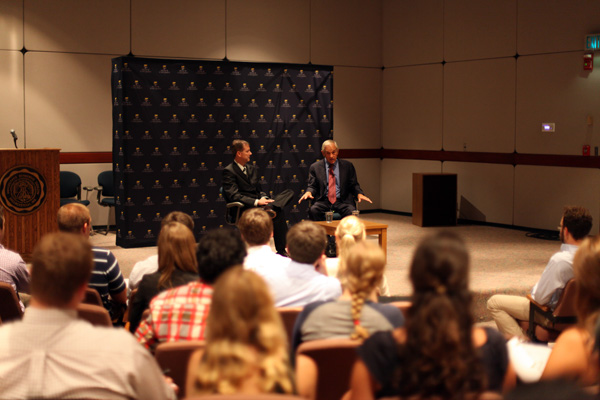 A student asked Paul when he decided he wanted to pursue political office, and the answer was finished by his wife, Carol, who accompanied him on his trip to DePauw. She described how the doctor would return home after delivering a baby, bemoaning the amount of national debt the newborn was inheriting. Over time, she convinced him that he should take the message to a place where the people who heard it had an opportunity to make a difference: the United States Congress.
A student asked Paul when he decided he wanted to pursue political office, and the answer was finished by his wife, Carol, who accompanied him on his trip to DePauw. She described how the doctor would return home after delivering a baby, bemoaning the amount of national debt the newborn was inheriting. Over time, she convinced him that he should take the message to a place where the people who heard it had an opportunity to make a difference: the United States Congress.
Paul posed for photos with the students after the session, then held a news conference in which he answered questions about foreign policy, the nation's economy, and the 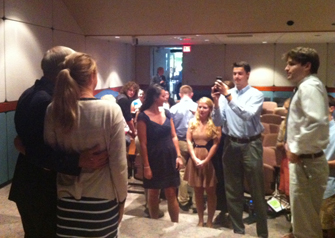 state of the Libertarian Party. That was followed by a reception at the Inn at DePauw, which was attended by approximately 50 students, faculty members, staff and alumni.
state of the Libertarian Party. That was followed by a reception at the Inn at DePauw, which was attended by approximately 50 students, faculty members, staff and alumni.
Established in 1986 through the generous support of 1958 DePauw graduates Timothy H. and Sharon Williams Ubben, the Ubben Lecture Series was designed to "bring the world to Greencastle."
Previous Ubben Lecturers have included Margaret Thatcher, Bill Clinton, Benazir Bhutto, Tony Blair, Mikhail Gorbachev, Jane Goodall, Ross Perot, Shimon Peres, Elie Wiesel, General Colin Powell, John Major, Barbara Bush, Spike Lee, Mike Krzyzewski, Jesse Jackson, Doris Kearns Goodwin, Ambassador L. Paul Bremer, Mitch Albom, General Wesley Clark, George Will, Andrew Young, Lee Hamilton '52, Bob Woodward, 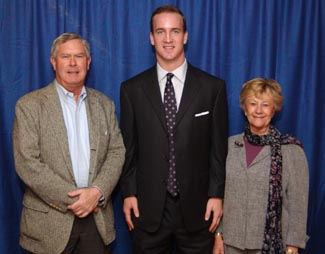 Willy Brandt, Oscar Arias, Ken Burns, Paul Volcker, Karl Rove, Howard Dean, Carl Rowan, Leymah Gbowee, Rebecca Skloot, Ralph Nader, Harry Belafonte, David Gergen, David McCullough, Carl Bernstein, Todd Rundgren, Naomi Wolf, Richard Lugar, Jane Pauley, Bill Bradley, Julian Bond, Paul Tsongas, Jimmy Wales, Nicholas Carr, Jason Reitman, David Ho, Candy Crowley and many others. (at right: Tim and Sharon Ubben with Peyton Manning; October 26, 2004)
Willy Brandt, Oscar Arias, Ken Burns, Paul Volcker, Karl Rove, Howard Dean, Carl Rowan, Leymah Gbowee, Rebecca Skloot, Ralph Nader, Harry Belafonte, David Gergen, David McCullough, Carl Bernstein, Todd Rundgren, Naomi Wolf, Richard Lugar, Jane Pauley, Bill Bradley, Julian Bond, Paul Tsongas, Jimmy Wales, Nicholas Carr, Jason Reitman, David Ho, Candy Crowley and many others. (at right: Tim and Sharon Ubben with Peyton Manning; October 26, 2004)
To view a complete roster of Ubben Lecturers -- which includes links to video clips and news stories -- click here. Video montages of many events are available on YouTube.
